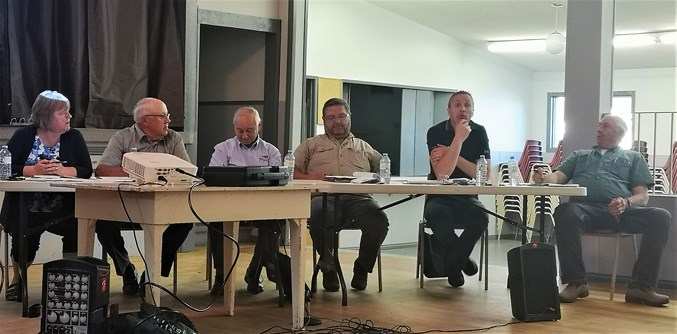Although pleased that Westlock County council is seeking public input into next year’s budget, some ratepayers want more transparency into the municipality’s expenses.
Ten people attended the 2020 budget consultation June 17 in Pickardville Hall. After an hour of presentations from county administration residents had the chance to give their thoughts to council regarding the 2020 budget.
In the past 10 years, residential and farmland assessments have been steadily growing, while non-residential and linear assessments went the other way. This is due to changes in the market, but linear assessments are done at a provincial level with no municipal input, said county director of corporate services Diane Urkow.
In 2018 “we had one significant company that went bankrupt and the county had to write off $850,000 of municipal tax dollars. That’s an eight per cent change in our revenues,” she noted.
These losses have a cumulative effect in future years.
The county faces more difficulties in clarity for the 2020 budget predictions.
“The new (provincial) government has not passed a budget for 2019 so any of our grant funding is still very unknown for 2019 and future years,” said Urkow.
The new Municipal Government Act also includes a requirement of a 5:1 ratio for the non-residential to residential tax rate — the county is at 5.51:1.
CAO Leo Ludwig gave a short presentation on the new ICF and IDP agreements the county must sign, saying that they will be taking up a large portion of their time and resources since the deadline is April 1, 2020.
He also brought up the Tawatinaw Ski Hill. He said an internal inquiry deemed the process council followed with the operation agreement was legitimate.
2020 predictions
According to the county’s five year plan, the projection for 2020 capital expenditures is $2,996,400, leaving a total of $1,436,400 unfunded. The figures show a significant decrease in projections for grant funding.
The county must keep a balanced budget, so to offset a loss in revenue, they projected an increase in the tax levy to 6.99 per cent for 2020.
Ludwig urged the crowd to consider that “property tax is our primary revenue source.”
Ratepayer input
Those in attendance noted that they were pleased with the format of the meeting. Questions to council were moderated by Darin Flemmer.
Council was commended for staying low on debt, and their handling of the community grants program. But the absence of Coun. Darrell Osmond was also noted by the crowd.
Questions were brought up regarding the county’s contingency plans to offset linear budget losses. Urkow explained that county operates a reserve for those situations.
One proposition was to get rid of agricultural services.
“Everything that ag services does today is done in the private sector better and for free. Put it into transportation, that’s where it should be,” said Jim Wiese.
The Tawatinaw Ski Hill remains an issue for ratepayers, who brought up the $485,294 budgeted for the hill in 2019 — the figure is similar for 2020).
Coun. Fred Slobodian noted that the figure also includes debt that is being paid from the construction of the chalet and is not limited to operation costs alone.
Wendy Batog, president of the Tawatinaw Ski Club, said that they brought 9,000 people to the ski hill for the winter season.
Public propositions also included a rethinking of infrastructure services being provided. For example, as several noted, gravel roads which are only being used seasonally for farming should not be plowed in the winter, but gravel rotation should be increased.
Director of Infrastructure Al Scott was very receptive to that idea and invited ratepayers to further conversation.
Resident David Woynorowski suggested the county could better engage ratepayer discussion with a cost on a per user basis for whatever service is provided.
“Just tell us what the numbers are and then we can make choices,” said Woynorowski.
Council is planning another public input meeting regarding the 2020 budget in the fall.



